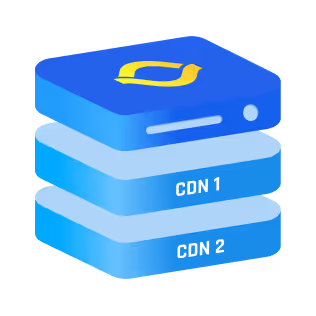Table of contents
CDN caching improves your website by:
- Enhancing Speed
- Reducing Bandwidth Costs
- Decreasing Server Load
- Increasing Reliability
- Improving User Experience
{{cool-component}}
It can also help reduce bandwidth costs and server load, enhance website reliability by distributing traffic, and improve user experience with faster page loading speeds. Here’s how profound it can be for you:
Efficient Content Delivery Through Caching
By leveraging in-network caching, users across the globe experience faster page loads, as requests are fulfilled by the nearest cache server rather than the origin server.
This localized delivery method ensures a smoother, more responsive user experience, crucial for retaining visitors and improving engagement rates.
Reduced Load on Origin Servers
One of the most significant advantages of CDN caching is the substantial reduction in load on the origin servers.
By serving the majority of content directly from cache servers, the number of requests that reach the origin server decreases, mitigating the risk of performance bottlenecks or downtime during traffic surges.
Lowered Bandwidth Costs
Bandwidth consumption directly impacts web hosting expenses, making CDN caching an attractive solution for cost reduction.
By serving cached content from servers closer to the user, the amount of data transferred from the origin server diminishes, resulting in lower bandwidth usage and subsequently reduced costs.
Improved Site Reliability and Availability
The distributed nature of CDN caching means that content is replicated across multiple servers around the world. This redundancy ensures higher content availability and reliability, as users are seamlessly redirected to another cache server if one becomes unavailable due to technical issues or maintenance.
Cache Hit Ratio and Performance Optimization
The cache hit ratio indicates the effectiveness of a CDN's caching strategy. A high cache hit ratio means that most user requests are served from the cache, highlighting efficient caching and reduced reliance on the origin server.
Optimizing CDN configurations, particularly through the careful selection of cache expiration policies and cache keys, can do the following:
Content Protection and Secure Delivery
Beyond performance enhancements, CDN caching also offers added layers of security for cached content. Techniques such as secure token authentication and SSL/TLS encryption protect against unauthorized access and ensure the safe transmission of sensitive information.
This aspect of CDN caching is crucial for compliance with privacy regulations and safeguarding user data, reinforcing the security perimeter of websites utilizing CDN services.


.png)
.png)
.png)